
President of Armenia Serzh Sargsyan giving his speech. Source: Presidential Website
Global Voices attended the conference dedicated to the Centenary of the Armenian genocide on April 22, held in Yerevan's Karen Demirchyan Sports and Concerts Complex. The conference, titled “International Social and Political Global Forum Against the Crime of Genocide”, invited genocide scholars, historians, journalists, politicians and religious leaders to talk about the Armenian genocide, its legacy as well as its current and future consequences vis-a-vis international law.
The forum was initiated by the President of Armenia Serzh Sargsyan, who highlighted the importance of memory and remembrance in the experience of all Armenians. “Remembrance is a moral obligation,” he said. “It is our moral duty and right to commemorate the one-and-a-half million victims.” He then celebrated the conscientious objectors throughout history, those who stood up against genocide from within. He cited Irena Sendler and Raoul Wallenberg during the Holocaust, Paul Rusesabagina during the Rwandan genocide and Van Chhuon during the Cambodian genocide.
As for the Armenian genocide, he said that “the Armenian people has not forgotten and is grateful to those Kurds and Turks who covertly saved the lives of their Armenian neighbors.” He also thanked the “Arab people, who gave shelter to those who had narrowly escaped the Turkish yatagan, as well as the Russians, Americans and Europeans, who took care of the Armenian orphans or partook in the humanitarian efforts.”
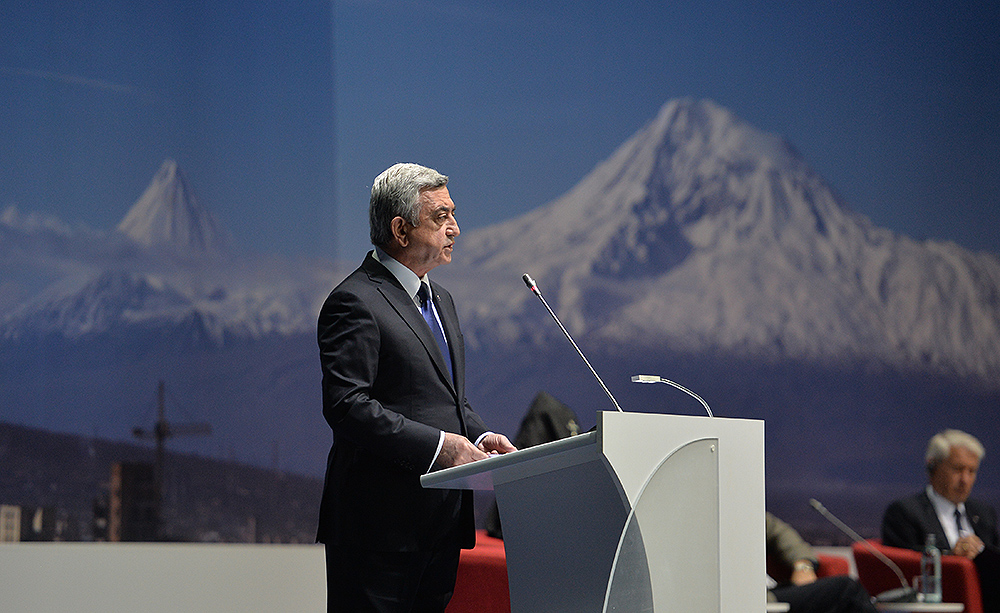
President of Armenia Serzh Sargsyan giving his speech. Source: Presidential Website
Following his speech came remarks by Karekin II, ‘Catholicos of All Armenians’ and the supreme head of the Armenian Apostolic Church, on the need for Christians to remain united in the Middle East and the world in the face of oppression, citing the current persecution suffering by those at the hands of the Islamic State radical group. He also spoke of the burden that the Armenian genocide poses on Armenians today and how the Turkish government’s official policy of denial is adding to the suffering.
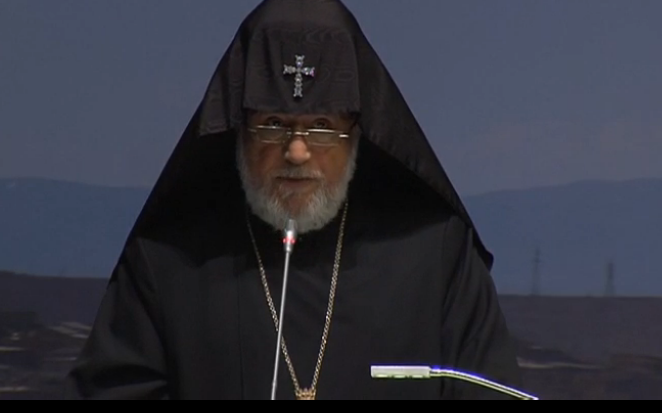
Karekin II. Source: Screenshot of the live broadcast.
Then came a stimulating talk by Thorbjørn Jagland, the secretary general of the Council of Europe. Jagland highlighted, several times, the importance of working together to move away from nationalism and instead ‘embrace internationalism’. He spoke of his meeting with then-Palestinian leader Yasser Arafat during which he met a leading Palestinian-Armenian priest who was still in possession of a ‘Nansen Passport’, named after Fridtjof Nansen, the then-high commissioner for refugees and Nobel Peace laureate known for his work with refugees.
Nansen worked to create internationally recognized refugee travel documents, the Nansen Passports, first issued by the predecessor to the United Nations — the League of Nations — which helped many refugees, including Armenians, find shelter in neighboring countries. Jagland praised Nansen while underscoring that the world is still facing challenges as great, if not greater, than those of the past, citing the Libyan and Syrian civil wars as well as the recent Lampedusa disaster.
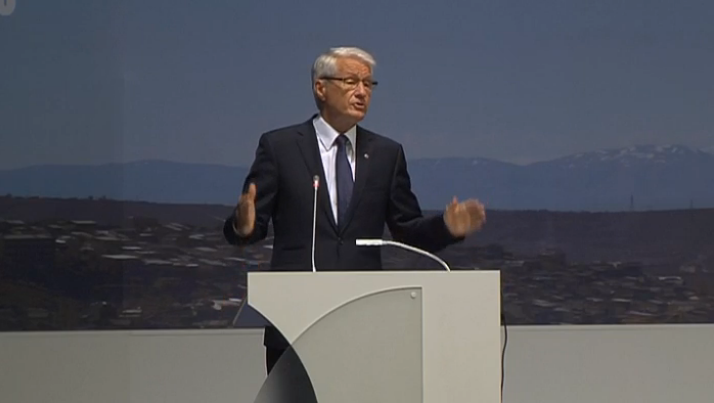
Torbon Jagland. Source: Screenshot of the live broadcast.
This was followed by Professor Daniel Feierstein, president of the International Association of Genocide Scholars. He reaffirmed the commitment of the community of genocide scholars to the recognition of the genocide committed against the Armenians, Greeks and Assyrians of the Ottoman Empire. He spoke of how genocides typically included the “destruction of the national identity of the oppressed and the imposition of the national identity of the oppressor.” He repeated Jagland’s warnings concerning the dangers of nationalisms by citing the cases of Pan-Turkism, Pan-Germanism and Pan-Serbianism in the Ottoman Empire, Nazi Germany and Yugoslavia, respectively, and of the need to include genocide scholars in the efforts to prevent further genocide.
During a ten-minute interval, delegates to the conference were shown scenes and images of several genocides, from the Armenian, Assyrian and Greek to the Cambodian and Rwandan, passing by the Holocaust and a few others. Also acknowledged was Raphael Lemkin, the Polish lawyer, who, moved by the Armenians’ situation, famously coined the term ‘genocide’.
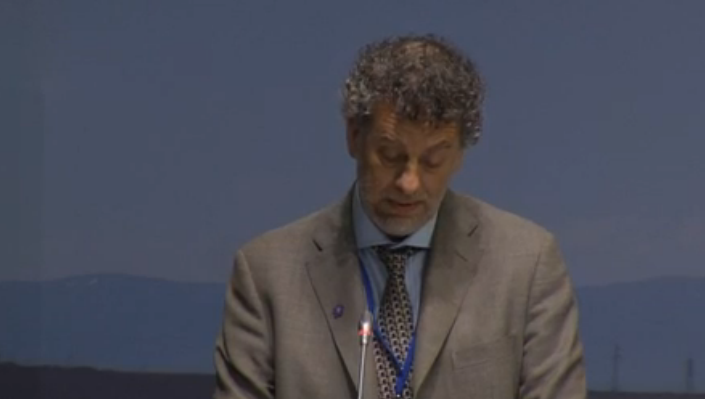
Daniel Feierstein. Source: Screenshot of the live broadcast.
‘The struggle of memory against forgetting’
The second part of the conference began with the theme “The Issue of Accountability and Elimination of the Consequences of Genocide.” It was initiated by Roger W. Smith, an internationally renowned genocide scholar who studied the Turkish government's policy of denial. He noted that besides the usual lawsuits and lobbying methods, the Turkish government has been attempting to downplay the Armenian genocide by promoting an “equal pain” strategy in which it claims that both Turks and Armenians suffered equally during the chaos of World War I. Explaining his presence at the conference, he quoted Milan Kundera, the Franco-Czech writer who wrote: “The struggle of man against power is the struggle of memory against forgetting.”
Then came the turn of Henry Theriault from the Armenian Genocide Reparation Study Group. Theriault wanted to dispel the myth that the 100th anniversary of the genocide could be seen as a climax. On the contrary, he affirms, it is a transition towards a future of recognition. He also reminded the room, to great applause, that the Armenians aren't the only people demanding recognition of genocide. He cited the Assyrian and Greek genocide but also the Herero and Namaqua people who suffered the crime of genocide by the government of German South-West Africa (modern-day Namibia) and the Native Americans.
When Theriault finished, the conference had its first Turkish speaker of the day. Cengiz Aktar is a political scientist, writer and journalist who is best known for his “I Apologize” campaign calling for an apology of the Turks towards the Armenians for the Armenian genocide, which was signed by 32,000 people.

Cengiz Aktar. Source: Screenshot of the live broadcast.
Aktar reported on the increasingly vocal movement for recognition of genocidal crimes within Turkish society. Every major publishing house in Turkey has published at least one book on the Armenian genocide in Turkish and the ‘G Word’ is becoming more acceptable in academic circles. Some descendants of the Armenians who had to convert to Islam to save their lives — the so-called Islamized Armenians, or Hidden Armenians — have re-converted to Christianity, while other Armenian Muslims have decided to remain Muslim all the while reclaiming their ‘Armenianity’. The first public commemoration of the genocide was held in Taksim Suqare in 2010 and, more importantly, citizens in at least 28 Turkish towns are planning on commemorating the Genocide this Friday.
Finally, Esther Mujawayo took the stage. Mujawayo is a survivor of the Tutsi genocide in Rwanda and currently works with genocide survivors as a sociologist. Her speech was emotionally charged and she stopped to take a breath every now and then. Standing before the audience, she wore traditional Tutsi clothes. Why?
“Because our mothers were stripped naked. I'm wearing my clothes for my mothers as well as your mothers.”
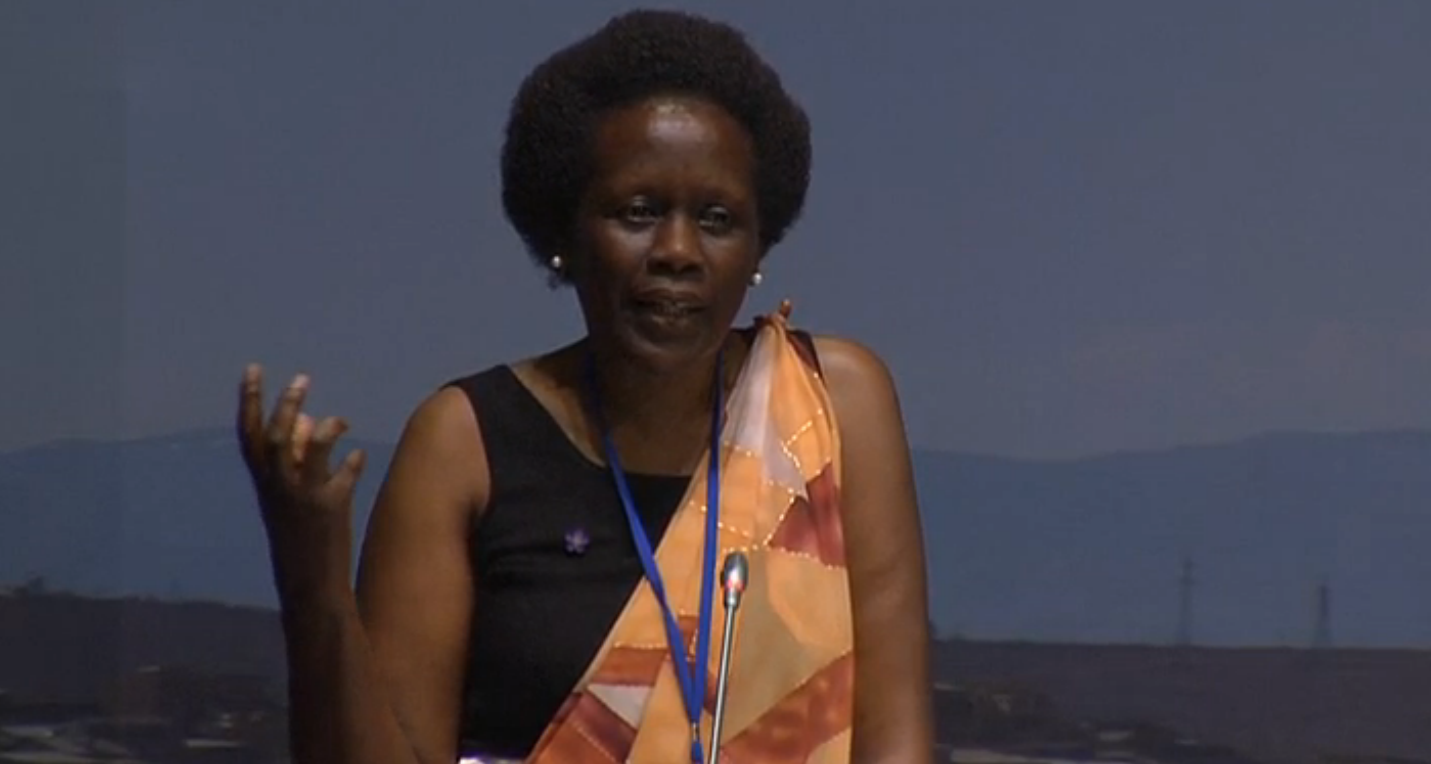
Esther Mujawayo. Source: Screenshot of the live broadcast.







2 comments